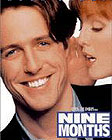|
|
|
|
Nine
Months
|
 |
|
Romantic comedies are usually childless. In fact many of the greatest films of this kind, such as His Girl Friday (1940) or The Lady Eve (1941) celebrate the merry lawlessness of romance, eternally defiant of the social obligations of family. From another angle, it is as if these lovers simply become each other's kids – and thus see no need to procreate. But what happens when idyllic coupledom is interrupted by pregnancy and the prospect of a radically new, responsible family lifestyle? In the '80s John Hughes, Hollywood's then-maestro of teen movies, decided to tackle this solemn question in She's Having a Baby (1987), starring Kevin Bacon and Elizabeth McGovern. Ostensibly a comedy, it came over more like a horror movie. Marriage, family and suburbia have rarely looked so terrifying or soulless. In a period of rampant romantic comedy, from Only You (1994) to French Kiss (1995), writer-director Chris Columbus once again invites us to contemplate the grave issue of childrearing and its consequences for lovers in Nine Months. Columbus is something of a Hughes protégé – he directed the Home Alone films under Hughes' close guidance as writer-producer – and he is similarly proficient at keeping proceedings as light and up-beat as possible. But the comedy in Nine Months, as in She's Having a Baby, is premised on utter anxiety. The elements of the story are familiar to the point of cliché. Sam (Hugh Grant) and Rebecca (Julianne Moore) are young, career-minded, but unfulfilled. Around them spin a gregarious married couple (Tom Arnold and Joan Cusack) who are kid-crazy, and a bohemian artist (Jeff Goldblum) who consorts with 20 year-old bimbos. The film's emphasis is firmly on Sam. When Rebecca becomes pregnant, he acts panic-stricken, irresponsible, boyish, self-centred, anguished and emasculated. Why don't women ever display such jitters in movies? In the '90s, only Martha Coolidge's Angie (1994) with Geena Davis dared show mothers-to-be as anything but centred, sensible and radiant. Hugh Grant is more like Cary Grant than ever – touches of shyness, kookiness, introspection – but, in America, his screen persona has lost some the sharper edges that were so effective in Four Weddings and a Funeral (1994). The irony, the acid tongue, the educated superiority are gone; when Sam testifies to Rebecca that he's been "reading up on Penelope Lively" to prepare for sensitive fatherhood, it is not the sort of tart, cultural joke typical of contemporary British comedy. Grant and Moore exhibit little rapport or old-fashioned romantic chemistry – indeed, the script contrives for them to be apart for most of the time. But it suits the resolutely flippant, feel-good atmosphere of Columbus' movies to have all the actors doing their own schtick as if revolving in separate worlds. Within this context, even normally excessive performers like Cusack and Goldblum manage to sparkle and amuse – and Robin Williams' circus turn as a Russian doctor with a loose grasp on gynaecological language is absolutely hilarious. There is nothing new, insightful or especially inventive in Nine Months. Yet, using every trick of his craft, Columbus has managed to make a warm, effusive, winning film – certainly his best since his directorial debut A Night on the Town (aka Adventures in Babysitting, 1987). The comedy nicely veers from sickly sentiment to chaotic slapstick in the hospital delivery rooms, as the men fight on the floor and the women scream for pain killers. And all that previous male anxiety? By the time the cute baby photos of the actors flashed onto the screen during the closing credits, I had almost forgotten it had ever come up as a topic. Almost. MORE Columbus: Bicentennial Man, Harry Potter and the Chamber of Secrets, Mrs Doubtfire, Only the Lonely, Stepmom © Adrian Martin September 1995 |
![]()